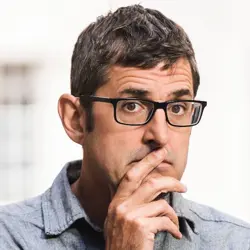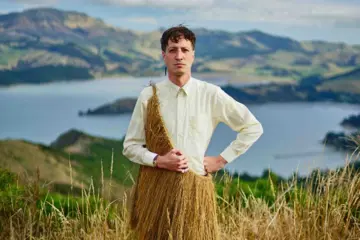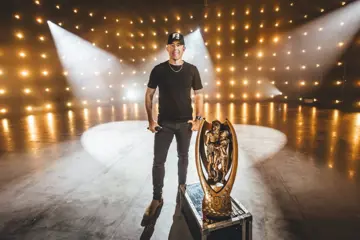 Louis Theroux
Louis TherouxThere's a moment in Heroin Town, the latest documentary by British filmmaker Louis Theroux, where the veteran broadcaster is invited to smell an uncooked lump of the highly addictive drug. He initially hesitates; "This is weird," he mutters warily. Slowly, he lowers his head close to the small, greyish pebble and takes in the scent, noting its sharp, vinegary odour - a sign that it's of a particularly high grade, he's told. It's an encounter, like many he experienced while making Heroin Town, that has left Theroux conflicted. "I'd never take heroin, obviously. But there is some curiosity; there's a part of you that wants to understand that rush," he admits. "I've wondered, if maybe some of it had touched my nose, just accidentally, if I'd have felt anything? Would I have an idea of how it actually feels?"
Anyone familiar with Theroux's work might find this lingering introspection surprising; as a documentarian, he has coined a uniquely unflappable trademark style of storytelling. Over the years, as showcased in his more than 60 films, he's applied this gentle demeanour to the task of charming a motley crew of unsavoury characters, from paedophiles to prostitutes, Christian fundamentalists to neo-Nazis. Through it all, it's his cool-as-a-cucumber manner that has proven to be his most useful asset, allowing him to be both objective observer and welcomed infiltrator.
With such a seemingly impenetrable armour of professional detachment, Theroux has followed stories where other documentary makers fear to tread. However, perhaps because his early career seemed to channel a more whimsical tone, finding humour in the counterpoint between his dry, emotional discipline and the psychological eccentricities of his subjects, his latest films feel like a watershed. In a new series for the BBC, Dark States, Theroux is uncovering the bleakest corners of American society. These harrowing stories are not found in the USA's great, moneyed metropolises, but rather in its many regional backwaters. Heroin Town brought Theroux to the small West Virginian city of Huntington. Across its population of just 49,000, one in four adults are addicted to the drug, resulting in a fatal overdose rate 13 times the national average. The most shocking statistic concerns the city's youngest residents: one in every ten babies born in Huntington comes into the world dependent on opiates. While this small corner of America may seem particularly blighted, it is a place that reflects a growing crisis in the States. The clear majority of addicts turn to heroin after becoming hooked on prescription medications, and as America's cavalier use of pharmaceuticals persists, the nation's drug problem continues to deepen.
"I'd never take heroin, obviously. But there is some curiosity; there's a part of you that wants to understand that rush."
Despite his tried and true skill at maintaining arms-length objectivity, what Theroux found in Huntington was nonetheless confronting. "Clearly, the stories stay with you, and you do find yourself thinking about them. There are times when because of the vulnerabilities of the contributors you sort of have to take off your documentary hat and put on one of more of a caretaker," he reveals. "To be honest with you, some of the most troubling material we ended up not using. What you see on screen is just the tip of the iceberg - and it's the scenes we abandon that you end up thinking about the most. Sometimes we have to say, 'Look, we can't use this story. It is just too complicated, and the dynamic of the people involved, and our role in their interactions is just too complex. We need to step out of this one.' When you're involved with people whose lives are so chaotic and so filled with angst, who are facing extremely distressing choices, you really have to try not to take too much of that home with you. That was particularly difficult with this film."
Don't miss a beat with our FREE daily newsletter
It's an intriguing thought that Theroux should so sensitively self-edit while filming in a country that seems hooked on a shamelessly sensationalist and often exploitative news media. But perhaps this isn't all that surprising; the question of boundaries - and the consequences of crossing them - is an idee fixe found throughout Theroux's canon of documentaries. "I think there's a very clear sense, to my mind at least, of the areas in which it's clearly not appropriate to film. That doesn't mean you should avoid certain situations - in a sense, you have to judge things as you find them. But I feel as though, if you're dealing with an adult who's in their right mind, and it feels like an important story, that's usually an indication that it's ok," Theroux explains. "There are other limiting factors of course, that are less for ethical reasons and more about storytelling and dramatic power. I really try to tell stories that I feel people will want to watch and engage with. The fact they're important stories is obviously a factor, but I don't think you can presume your audience will stick with it if it's not also interesting or intriguing."
It may well be that Theroux's choices in the cutting room reveal a kind of reflexive self-preservation. As I chat to the seasoned interviewer, he repeatedly pivots the dynamic, deflecting my questions with his own, effortlessly waltzing the conversation into affable chit-chat. It's apparent that Theroux's onscreen persona, with its quintessential Britishness expertly geared to corralling his subjects while putting them at ease, is second nature. It isn't hard to see why America has embraced him, as Theroux puts it, "As a vaguely exotic relative who isn't at all threatening." And yet, he's also a pragmatist, happy to drop any artistic pretensions to talk about the nuts and bolts of his process, rather than anything too emotionally intimate. It seems Theroux is thoroughly insulated against the personal toll his chosen profession could potentially take.
Which is just as well. He has spent his career immersed in communities with wildly unconventional lifestyles, most notably in his hugely popular break-out masterpieces, Louis Theroux's Weird Weekends, which saw him cosy up to survivalists, porn stars, UFO believers and semi-pro wrestlers (as well as a few less cutesy milieus). But it's been almost two decades since those joyrides through America's fringes, and by comparison, the Dark States series has seen Theroux go toe to toe with a far grittier reality.
I wonder if this shift draws any parallels with the ascendancy of the alt-right in America's political mainstream? Just for a moment, Theroux allows himself to be uncharacteristically candid. "Honestly, no. I think it's more a reflection of my own ageing process. I'm more mature and more confident that what I'm doing has value. The programs I've made in my career have changed over time, but they've always had a dark dimension to them, they've always been about people on the edge. I think what happened is that I became more competent in my storytelling, and at a certain point, I was faced with the decision that I could either make shows that were whimsical and funny, or I could take a different route. So, given the choice between making funny shows that didn't have any power, or making shows that explored really impactful stories, but weren't about creating humour? Well, it was a no-brainer."
Dark States: Heroin Town plays selected cinemas across Australia.















